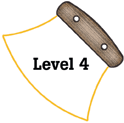
Alaska Science
Key Element D1
A student who meets the content standard should apply scientific knowledge and skills to understand issues and everyday events.
 |
Alaska Science A student who meets the content standard should apply scientific knowledge and skills to understand issues and everyday events. |
|
Performance Standard Level 4, Ages 15–18
|
|
|
|
Sample Assessment Ideas
|
Standards Cross-References
|
||
|
National Science Education Standards Formulate and revise scientific explanations and models using logic and evidence. Student inquiries should culminate in formulating an explanation or model. Models should be physical, conceptual, and mathematical. In the process of answering the questions, the students should engage in discussions and arguments that result in the revision of their explanations. These discussions should be based on scientific knowledge, the use of logic, and evidence from their investigation. (Page 175) Recognize and analyze alternative explanations and models. This aspect of the standard emphasizes the critical abilities of analyzing an argument by reviewing current scientific understanding, weighing the evidence, and examining the logic so as to decide which explanations and models are best. In other words, although there may be several plausible explanations, they do not all have equal weight. Students should be able to use scientific criteria to find the preferred explanations. (Page 175) Scientific explanations must adhere to criteria such as: a proposed explanation must be logically consistent; it must abide by the rules of evidence; it must be open to questions and possible modification; and it must be based on historical and current scientific knowledge. (Page 176) |
Benchmarks Scientists can bring information, insights, and analytical skills to bear on matters of public concern. Acting in their areas of expertise, scientists can help people understand the likely causes of events and estimate their possible effects. Outside their areas of expertise, however, scientists should enjoy no special credibility. And where their own personal, institutional, or community interests are at stake, scientists as a group can be expected to be no less biased than other groups are about their perceived interests. (Page 19) |
|
Table of Contents | Return to Alaska Native Knowledge Network